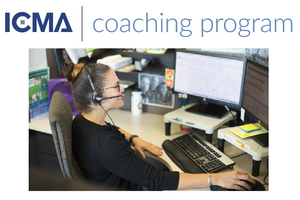

I’m a well-regarded planning technician in the Community Development Department of a mid-sized city. I’ve been in my current position for three years and have mastered most of the technical aspects of my job. I want to move up in my department but need exposure to other elements of planning, building, and development services, plus the opportunity to develop new knowledge and skills.
I believe that I have good potential, but I worry that others don’t see what I have to offer beyond my current position.
So, how do I start? Should I take some courses and workshops? What do you suggest?
The fundamental question is, how do you accelerate your development. The best way to accelerate your growth and development is through a series of stretching job assignments coupled with helpful and candid feedback or coaching.
What is a “stretch” assignment?
A University of Michigan School of Medicine paper provided the following definition:
“A stretch assignment is a project or task given to an employee which is beyond their current knowledge or skills level in order to ‘stretch’ the employee developmentally. The stretch assignment challenges employees by placing them into uncomfortable situations in order that they learn and grow.”
What are the benefits of stretch assignments?
For employees, a successful stretch experience can
- Help you develop new technical and/or “soft” leadership skills.
- Provide new knowledge.
- Expose you to other areas of the department or other city services.
- Develop new relationships with internal and external stakeholders.
- Reshape other people’s perceptions of your capabilities.
For the organization, stretch assignments offer many benefits as well. They provide
- Low-cost employee development.
Stretch assignments cost little. - Leadership “try-outs.”
Special projects or team assignments can try out emerging leaders as formal or informal leaders. - Succession development.
Since a wave of baby-boomer professionals and managers are retiring from local government, organizations can’t wait for people to develop. We need to accelerate development now and identify possible successors.
What are some examples of stretch projects?
As a plan checker in the Community Development Department, a stretch assignment for you could be any of the following
- Participating in a department budget team.
- Researching new “green” development practices.
- Serving on a multidepartment team to develop a specific plan for a new growth area in the city.
- Evaluating with other staff members potential vendors of new software that tracks development applications and activities.
- Leading a small workgroup to identify best practices and make recommendations for a telework program or alternative work schedules for department staff.
What do I need to know about stretch opportunities?
Learn through doing.
Both managers and their direct reports often believe that the best way to learn is to attend a workshop or class. A seminar or class is an excellent way to develop a conceptual framework about new behavior, but it doesn’t create new behavior. Only if you apply the material to your work does new behavior or authentic learning emerge.
Adults (as well as children) learn best through doing.
A stretching job assignment immediately exposes you to new areas of knowledge and produces opportunities to learn new skills. These kinds of special projects or team assignments accelerate your development if they are paired with feedback and coaching. Constructive feedback helps you acknowledge mistakes or missteps and learn from them.
Seek the “sweet spot” of learning.
When discussing a potential stretch assignment with your boss or others, seek the “sweet spot” of learning and development. The sweet spot is when you have a 50-70% chance of success. If your chance of success is only 40%, the project will tend to overwhelm you, and it will be too stressful. With a 90% chance of success, the stretch project will be too easy, and you won’t learn anything new.
If a stretch assignment is in your sweet spot, you will be uncomfortable but not too uncomfortable. Learning happens when you are uncomfortable but not overwhelmed or distressed.
Understand the ideal mix of development.
The ideal mix of development is 70/20/10: 70% of your development activities should be learning through doing; 20% of your development should be getting coaching; and 10% should be classroom training or education.
Ensure adequate support.
Before accepting a stretch assignment, you must ensure you have adequate support. Adequate support comes in many varieties:
- Management support, such as the community development director communicating to department staff the importance of the project.
- Sufficient time for work on the project (this is a critical area of support).
- Any budget monies needed for the project.
- A good mix of people on your team if the project involves a workgroup.
- Someone in management who can help you overcome any obstacles that arise or otherwise provide guidance and feedback.
- Adequate decision-making authority within certain “guide-rails.”
Assuming you are offered a special project, you should negotiate adequate support before embarking on the project.
Ask key questions! In her article "15 Questions To Ask Before Accepting A Stretch Assignment" (Forbes. March 14, 2019) Jo Miller identified several themes, which include
Support from the top: Always ensure that expectations are agreed on, and you have support from leadership.
Work-life balance: Work-life balance is important, especially in a career like local government that often requires after-hours investment of time.
Is this something new? When you take a stretch assignment, it's important that you stretch! If you're just adding more work of a similar level to your task list, that's only making more work. Make sure you're using new or different skills, or skills you want to brush up on, are meeting different people, or advancing the organization's goals beyond your usual scope.
Keep one eye on the way forward: If you set yourself up for success by answering all the questions in Jo's article, these assignments will be career-building. But, always ask if the investment if time will deliver a return, or otherwise "open more doors" in the paths ahead.
How do I secure a stretch assignment?
While your manager or another manager may approach you with a stretch project, don’t wait for someone to offer you the opportunity. You must take charge of your own learning and career development.
Be on the lookout for opportunities
To seek out a stretch project, you must first ensure that you continue to handle your current job responsibilities successfully. You won’t get new opportunities unless you are seen as a good performer in your current position.
Second, you must be on the lookout for new projects (and ask your colleagues to also be on the lookout for you). Know the kinds of new challenges facing the city council, city manager, and the community development director, and keep your ears open for opportunities to participate as new initiatives begin to emerge.
Third, make it known that you’d like a stretch opportunity. Have a development conversation with your supervisor and/or manager or other key managers inside and outside your department. In a development conversation, you can discuss your career aspirations, new areas of knowledge or skills that you desire, new stretch assignments that may accelerate your development, and any support you may need.
Through these formal or informal development conversations, you want to “hook” the supervisor or manager on your development as an active supporter. As part of the discussion, you should ask the manager to let you know of any new project opportunities.
Depending on your relationship, ask for the manager to “sponsor” or recommend you for the new team or project.
Ensure 2 + 1
To provide feedback as well as help in securing stretch opportunities, you must have support, especially from a formal or informal coach.
You should go beyond your immediate supervisor or manager who may serve as a coach. The minimum number of coaches is 2 + 1.
For adequate coaching support, you need a formal or informal coach in your department who knows your work or the workings of the department. You also need a coach in another city department who has a bigger picture view and a good feel for the organization and knows how things work. These are the “2.”
In addition, you must have a coach outside the city organization who can provide advice and generally guide you. That’s the “1.”
The coach outside your organization can suggest some involvements in professional associations in order to enhance your knowledge, skills, and network (see Career Compass #48 entitled “How Do I Benefit From a Coach?”).
How do I maximize the stretch opportunity?
Here are some tips to leverage your stretch assignment:
1. Be an agile learner
Since you won’t be a subject-matter expert in your new assignment, be curious, ask questions, seek advice, and learn as you go. For example, ask:
- Why is this special project important?
- What’s the “why” behind the effort?
- What do we all need to learn?
- What am I missing?
- What else should I consider?
- What would be a completely different approach for addressing the challenge?
2. Engage people in many conversations
Go out of your way to engage diverse people inside and outside the organization in conversation about the issue and the effort. Listen and be open to the conversation. By doing so, you will expand your perspectives and your network.
3. Try out new roles
As you engage in the project, try out some new roles. For instance, if you are good at analysis, try out public speaking about the challenge and project (start in a safe environment). Again, learning and skills-building happen when you get uncomfortable.
4. Leverage the assignment
Over-deliver if possible. Over-delivering will get you future stretch projects and additional opportunities to learn and grow.
(For other suggestions on how to maximize the stretch experience, see Jo Miller, “4 Ways To Execute a Stretch Assignment Like a Rock Star,” forbes.com, Dec 16, 2017.)
A Catalyst for Growth
Stretch experiences coupled with helpful and candid feedback are catalysts for rapid career growth. In addition to new learning, relationships and skills-building, stretching job assignments help people see you in a new light (see also Career Compass #52 entitled “Recasting My Rep”).
These experiences shape other people’s perceptions of you that are more aligned with your potential and career aspirations.
 Sponsored by the ICMA Coaching Program, Career Compass is a monthly column focused on leadership and career development issues for local government professional staff. Dr. Frank Benest is ICMA’s Liaison for Next Generation Initiatives and resides in Palo Alto, California. If you have a leadership or career question you would like addressed in a future Career Compass, e-mail careers@icma.org or contact Frank directly at frank@frankbenest.com
Sponsored by the ICMA Coaching Program, Career Compass is a monthly column focused on leadership and career development issues for local government professional staff. Dr. Frank Benest is ICMA’s Liaison for Next Generation Initiatives and resides in Palo Alto, California. If you have a leadership or career question you would like addressed in a future Career Compass, e-mail careers@icma.org or contact Frank directly at frank@frankbenest.com
New, Reduced Membership Dues
A new, reduced dues rate is available for CAOs/ACAOs, along with additional discounts for those in smaller communities, has been implemented. Learn more and be sure to join or renew today!
